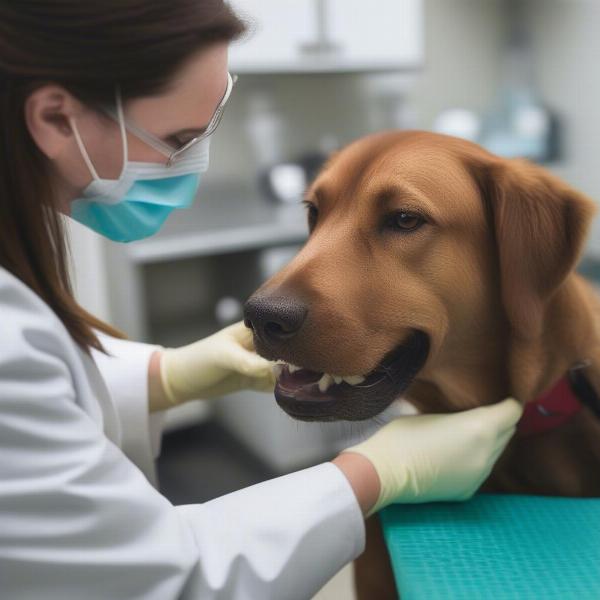Bloody gums in dogs can be a concerning sign, indicating a range of potential issues from minor gum inflammation to more serious underlying health problems. Understanding the possible causes, recognizing the accompanying symptoms, and knowing when to seek veterinary care is crucial for every dog owner. This article will explore the common reasons for bloody gums in dogs, discuss associated symptoms, and outline appropriate treatment options.
What Causes Bloody Gums in Dogs?
Several factors can contribute to bloody gums in dogs. Some of the most frequent causes include periodontal disease, trauma, infections, clotting disorders, and certain systemic illnesses. Periodontal disease, characterized by inflammation and infection of the gums and surrounding tissues, is a common culprit. Trauma to the mouth, such as chewing on hard objects or getting injured during play, can also lead to bleeding gums. Infections, whether bacterial, viral, or fungal, can cause gum inflammation and bleeding. Clotting disorders, which affect the blood’s ability to clot properly, can manifest as bleeding gums. Finally, systemic illnesses, such as autoimmune diseases and certain cancers, can sometimes present with bloody gums as a symptom.
Recognizing the Symptoms: Beyond Just Blood
While bloody gums themselves are a noticeable sign, it’s important to look for other accompanying symptoms. These can include bad breath, difficulty eating, excessive drooling, pawing at the mouth, swollen gums, loose teeth, and lethargy. The presence of these additional symptoms can help pinpoint the underlying cause of the bleeding and guide appropriate treatment.
When to Seek Veterinary Care for Bloody Gums
If your dog’s gums are bleeding, it’s essential to seek veterinary care, especially if the bleeding is persistent, profuse, or accompanied by other symptoms like lethargy, loss of appetite, or difficulty breathing. A veterinarian can perform a thorough examination, including blood tests and other diagnostic procedures, to determine the underlying cause and recommend appropriate treatment.
Treatment Options for Bloody Gums in Dogs
Treatment for bloody gums will depend on the underlying cause. For periodontal disease, professional dental cleaning, antibiotics, and pain management may be necessary. In cases of trauma, the veterinarian may need to clean and suture the wound. Infections may require antibiotics or antifungal medications. Clotting disorders will necessitate specific treatment based on the underlying condition. For systemic illnesses, addressing the underlying disease is crucial.
 Veterinarian examining a dog's bloody gums
Veterinarian examining a dog's bloody gums
How to Prevent Bloody Gums in Dogs
Regular dental care is crucial for preventing periodontal disease and subsequent bleeding gums. Brushing your dog’s teeth daily, providing appropriate chew toys, and scheduling regular veterinary dental cleanings are essential preventative measures. Avoiding potential sources of trauma, such as hard objects or sharp toys, can also help minimize the risk of gum injuries. Maintaining your dog’s overall health through a balanced diet, regular exercise, and routine veterinary checkups can further contribute to healthy gums.
Conclusion
Bloody gums in dogs should never be ignored. By understanding the potential causes, recognizing associated symptoms, and seeking timely veterinary care, you can help ensure your furry friend’s oral health and overall well-being. Regular dental care and preventative measures can significantly reduce the risk of bloody gums and contribute to a happy, healthy life for your canine companion.
FAQs
- Can dry food cause bloody gums in dogs? While dry food itself doesn’t directly cause bloody gums, it can contribute to tartar buildup, which can lead to periodontal disease and bleeding gums.
- Is it normal for a puppy to have bloody gums during teething? Some minor bleeding may occur during teething, but excessive or persistent bleeding should be checked by a veterinarian.
- Can stress cause bloody gums in dogs? Stress can indirectly contribute to gum problems by weakening the immune system, making dogs more susceptible to infections that can cause bleeding gums.
- What are the first signs of internal bleeding in dogs? what are the first signs of internal bleeding in dogs
- Can certain medications cause bloody gums in dogs? Some medications, such as anticoagulants, can increase the risk of bleeding, including bleeding gums.
- What home remedies can I use for my dog’s bloody gums? It’s important to consult a veterinarian before trying any home remedies for bloody gums, as they may not address the underlying cause and could potentially worsen the condition.
- Can dog hookworms cause bloody gums? dog hookworms
ILM Dog is a leading international online resource dedicated to providing dog owners with expert advice and information on all aspects of dog care. We offer comprehensive guides on dog breeds, health, training, nutrition, grooming, activities, and much more. Whether you’re a new dog owner or a seasoned expert, ILM Dog has the resources you need to ensure your canine companion lives a long, healthy, and happy life. Contact us at [email protected] or call +44 20-3965-8624 for more information. We are committed to providing high-quality, reliable information, drawing upon expert knowledge and the latest research in canine care, including proper dental hygiene and addressing concerns like bloody gums. For all your dog-related inquiries, trust ILM Dog.